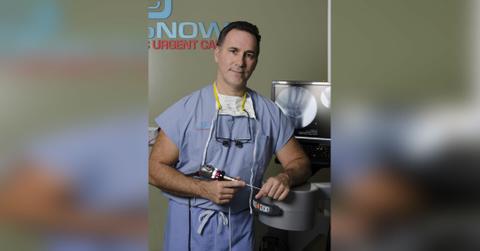
Reasons To Be Hopeful About Healthcare, According To Dr. Alejandro Badia
Dr. Alejandro Badia, a nationally recognized orthopedic surgeon who practices throughout the country, predominantly in Miami and New York has often been critical of his industry, in 2020, he authored Healthcare from the Trenches: An Insider Account of the Complex Barriers of U.S. Healthcare from the Providers and Patients' Perspective, an in-depth behind the scenes indictment of the corrupt and broken US Healthcare system, based on his own experiences as a practicing doctor in that system.
But as Dr. Badia takes a look at the evolving healthcare system, in the wake of the COVID pandemic and current frightening headlines shouting of a new “Tripledemic” of resurgent COVID-Flu-RSV infections as the fall turns to winter – he is seeing more reasons to be hopeful than one might think.
1. TELEMEDICINE — Pre-COVID it was unheard of, but now, it’s making a wide variety of care available to more patients. Says Dr. Badia “For behavioral health, it’s a no brainer, but it’s also helpful for some post-op surgical checks, or to answer questions and in my orthopedic practice, to be able to check for physical function without the patient having to make the trip to the office.”
2. UBER “AMBULANCE” – The widespread use of ridesharing services has made it significantly easier for patients to get to appointments – even in some emergencies. Adds Dr. Badia, “It’s faster, easier and significantly cheaper than an ambulance and it helps place the priority for EMTs on the most serious emergencies.”
3. HEALTH MONITORING WEARABLES – Technology continues to improve in patient health monitoring — from EKG to blood sugar and sweat electrolytes that can be detected by sensors. Dr. Badia: “Not only are patients more in tune with their vital signs or concerns, but that info can be shared in realtime with their doctors."
4. MINIMALLY INVASIVE SURGERY – “This goes beyond robotics, which was a seismic shift in surgery,” observes Dr. Badia. “The fact is we do most joint surgeries arthroscopically while our vascular surgeon friends do endovascular procedures, passing catheters via tiny holes. And the idea of an appendectomy or gallbladder surgery scar is a thing of the past with most surgeons able to complete the surgery through two or even one small hole where you’ve already got one – your belly button.”
5. GENE THERAPY – “The possibilities in this area are huge,” says Dr. Badia. While it’s currently somewhat limited and costly much of what we will treat in terms of congenital diseases and even some chronic illnesses will be addressed by correcting the underlying genetic issue. “And with more public engagement and increased use, that cost will go down.”
6. VIRTUAL/AUGMENTED REALITY – Another tech area that will have a big impact on physician and public education – and can ultimately allow for minimal or no sedation in surgery (at my practice we do it via WAVR). It could one day lead to fully remote surgery.
7. COST TRANSPARENCY – The biggest gripe about heathcare is the cost. And while it’s difficult to say whether costs will go down as the system evolves, healthcare costs will soon be clear public knowledge as pressure is applied to providers (mostly hospital systems) and carriers alike. It will allow patients to do some comparison shopping to find the best rate for their needs. While a plus, Dr. Badia adds, “It will require the patients to be well informed on their options, to appropriately weigh costs and benefits of their options beyond a dollar amount.”
8. GROWTH OF OUTPATIENT CARE — Hospitals are overextended and can be complicated places to manage for patients because of their "all-inclusive" practices on the premises.In the near future, hospitals will become essentially big ICU’s, (Intensive Care Units) caring for for the sickest patients or those in need of major surgeries like cardiothoracic, neurosurgery and organ transplants. Even now, hip/knee/shoulder replacements are increasingly done in specialized outpatient surgery centers. “It’s cheaper, more efficient, and holds less of an infection risk than doing these procedures at ‘the big house,’" says Dr. Badia. As more services move to outpatient facilities, the overall patient experience can become more pleasant and easier to access. “It really puts the patient experience front and center.”
9. NUTRITION — The line between Allopathic and traditional medicine is virtually gone.Healthcare providers have widely embraced the issues that we can modify via diet (and exercise). Says Dr. Badia: “We now all agree ‘you are what you eat’ and this will have profound impact on chronic disease or general overall wellness and quality of life.”
